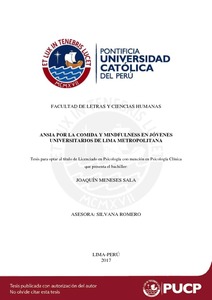Ansia por la comida y mindfulness en jóvenes universitarios de Lima Metropolitana
Abstract
Los estudiantes universitarios son vulnerables a estados emocionales negativos, como por
ejemplo el estrés. Asimismo, es una etapa en donde los hábitos alimenticios cambian.
También, hay información sobre un mayor sobrepeso en jóvenes. El ansia por la comida
podría estar contribuyendo de manera significativa a estas cifras. Ésta se ha relacionado
a otras consecuencias negativas, como a la adicción a la comida, atracones y bulimia. Por
tanto, esta investigación buscó analizar las relaciones de los factores del mindfulness con
el ansia por comer y sus distintas manifestaciones, en una muestra de 405 estudiantes
universitarios, 51,6% hombres y 48,4% mujeres, de 16 a 22 años de edad (M=18.03,
D.E=1.20). Se llevaron a cabo análisis de correlación de Spearman y comparación de
medianas. Se encontró que a mayores niveles en ciertas facetas del mindfulness había
menores índices de ansia por la comida. Por otro lado, se encontraron relaciones
inesperadas y ausencia de relaciones entre ciertas facetas del mindfulness y el ansia por
la comida. Asimismo, se encontraron diferencias en el ansia por la comida y relación con
el mindfulness según el sexo de los participantes. Con todo, los hallazgos presentados
sugieren que programas basados en el mindfulness podrían beneficiar a aquellos
individuos que suelen alimentarse bajo un estado de ansia. University students are vulnerable to negative emotional states, for example stress.
This is a stage of life where certain habits like eating are compromised. Keeping in mind
that there are high levels of obesity in Peruvian young adults, food cravings can be
contributing to those levels. Food cravings has been linked to other negative
consequences like food addiction, binge eating and bulimia. Thereby, this research aimed
to analyze the relationship between the factors of mindfulness and food cravings and their
subsequent attributes in 405 university students, 51,6% males and 48,4% females, from
16 to 22 years old (M=18.03, D.E=1.20). Spearman and comparisons of means where
assessed. The findings showed that higher levels of some of the mindfulness facets are
associated with lower levels of food cravings. However, the study found unexpected
relations and none relations between some other facets of mindfulness and food cravings.
Also, an unexpected association was found between the Observing facet and food
cravings. Furthermore, the relations between food cravings and mindfulness changed
depending on the sex of the participants. The findings of this research suggest that
mindfulness intervention programs may be beneficial to individuals that tend to
experience food cravings
Temas
Trastornos de la nutrición
Hábitos alimenticios
Atención
Estudiantes universitarios--Investigaciones
Hábitos alimenticios
Atención
Estudiantes universitarios--Investigaciones
Para optar el título de
Licenciado en Psicología Clínica
Collections
The following license files are associated with this item:






